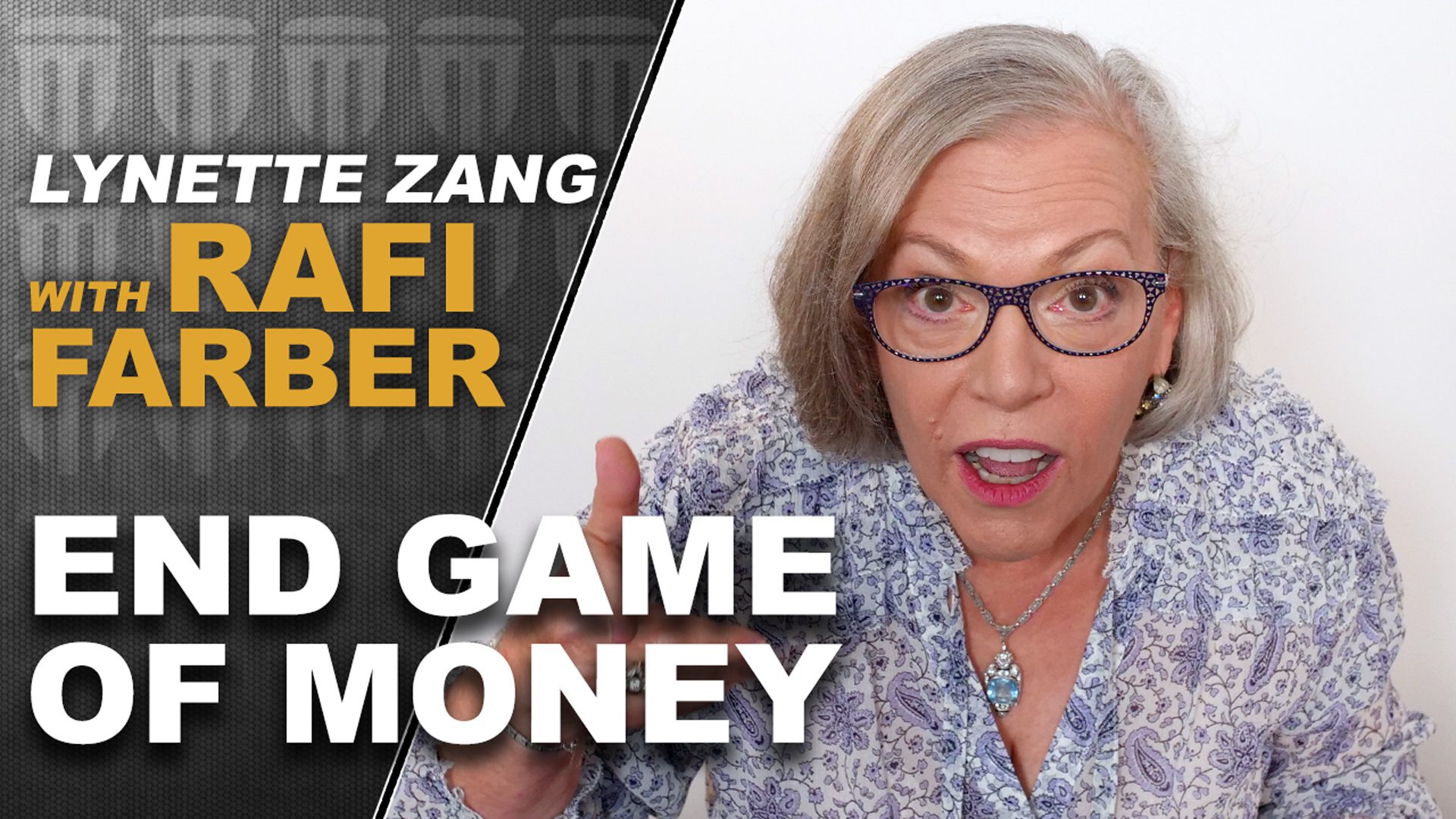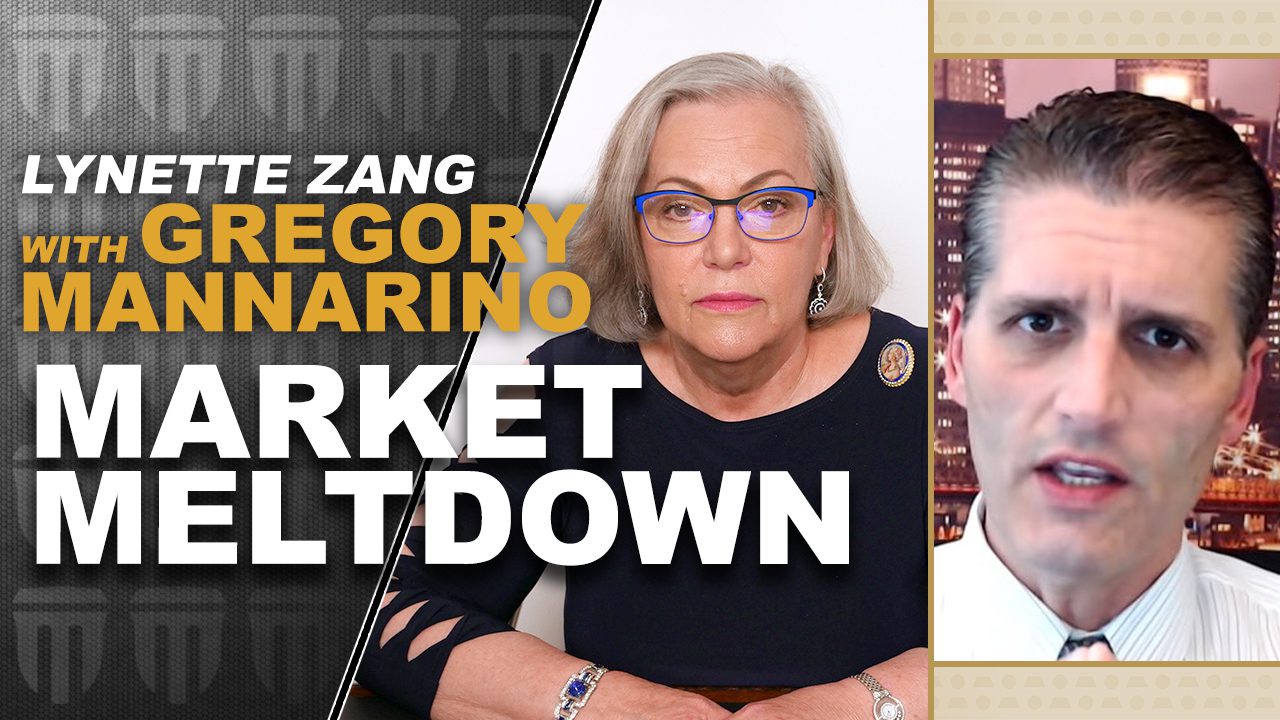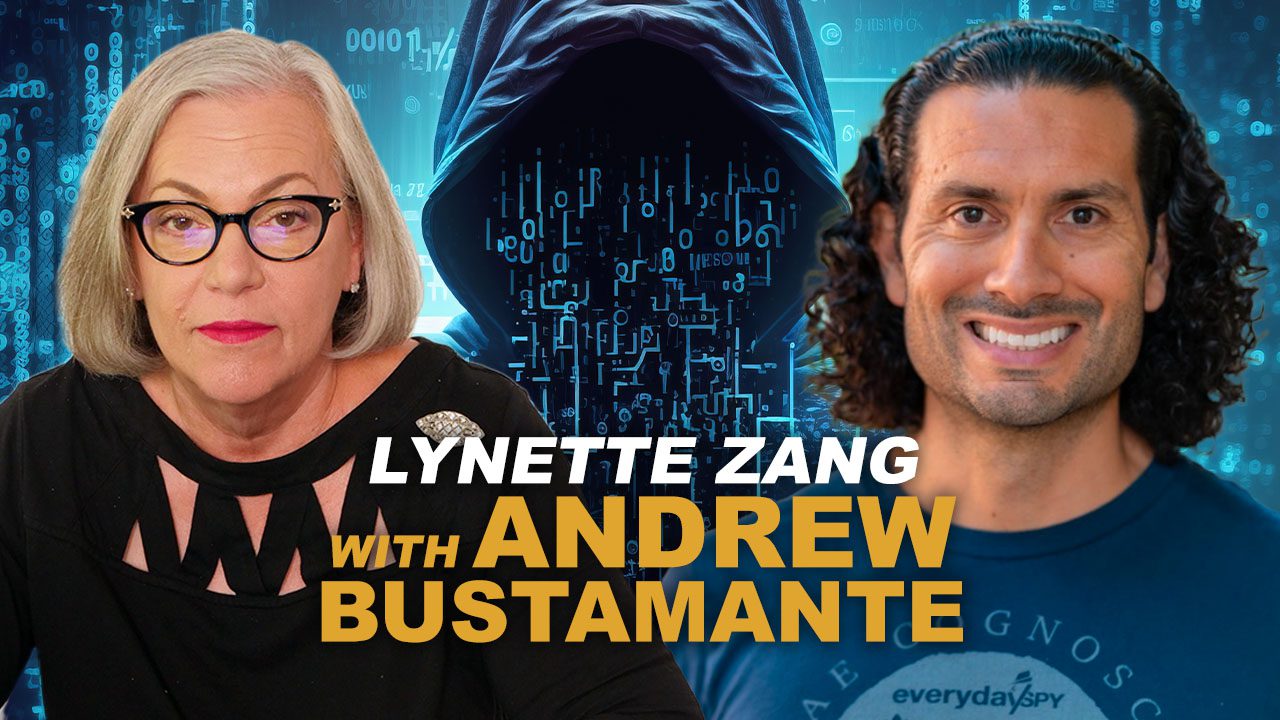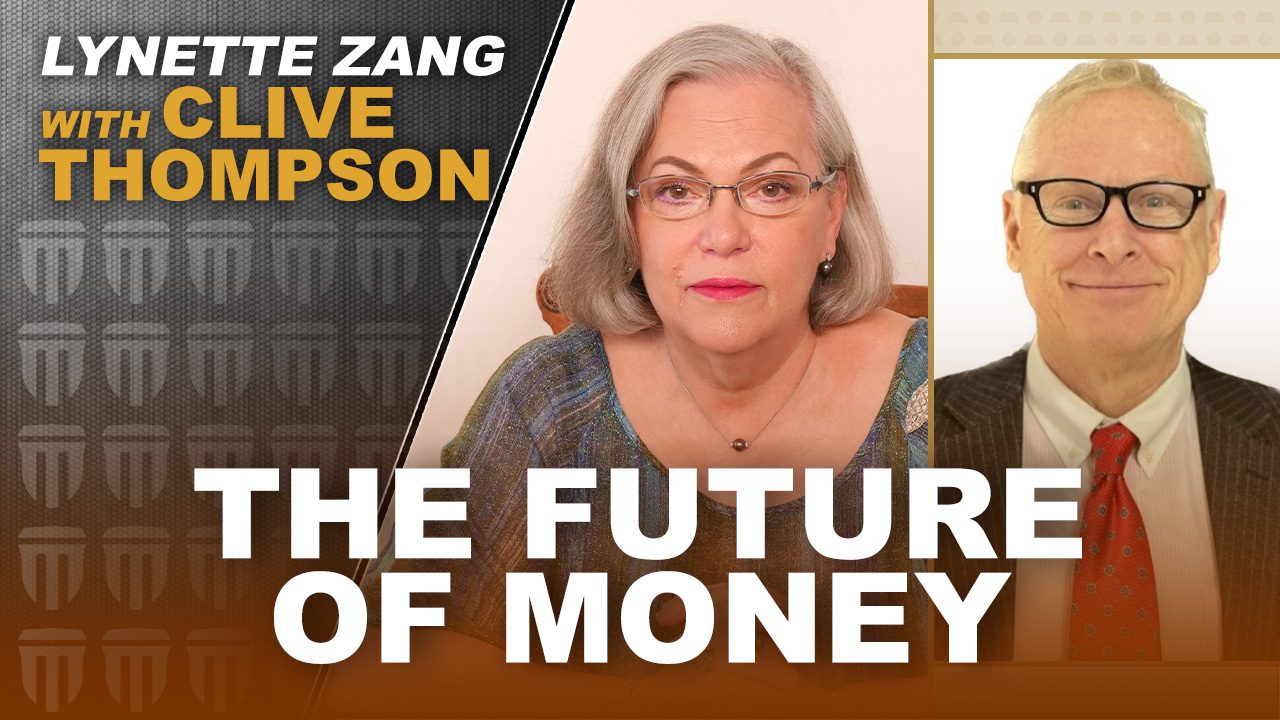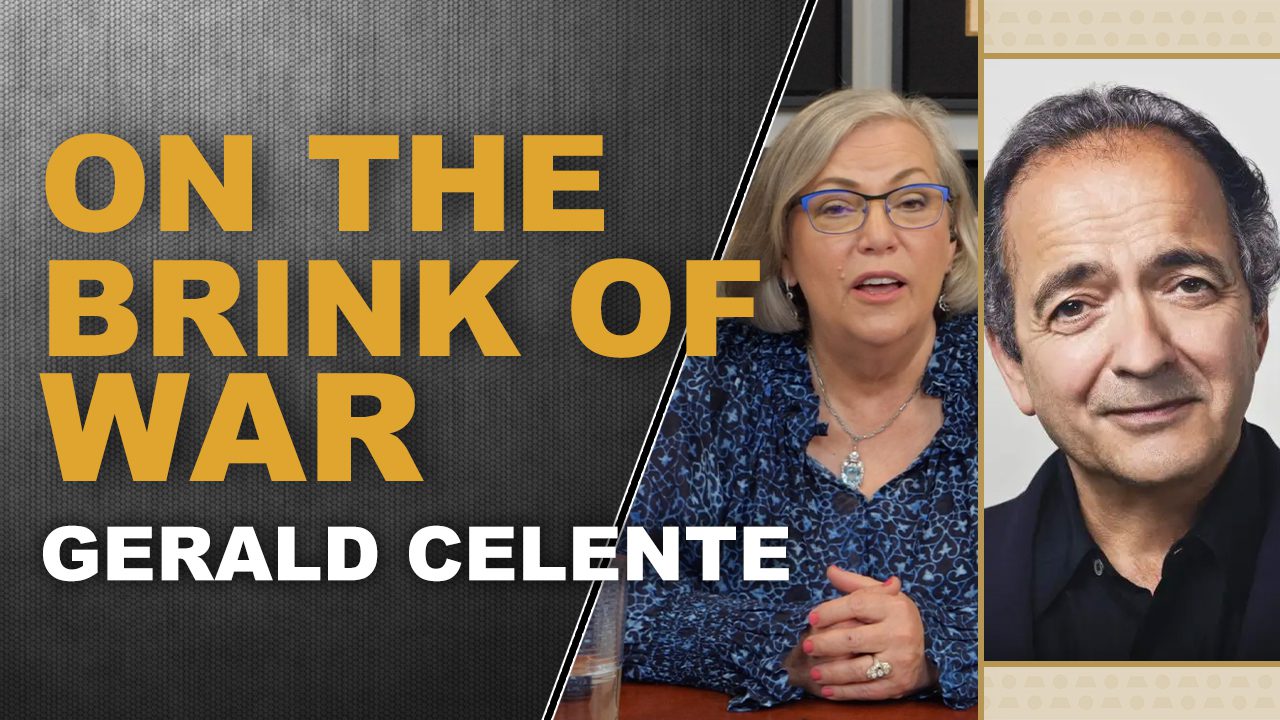[PT. 1] JUST BEFORE HYPERINFLATION: The Signs to Look Out For…with Arpad & Lynette Zang
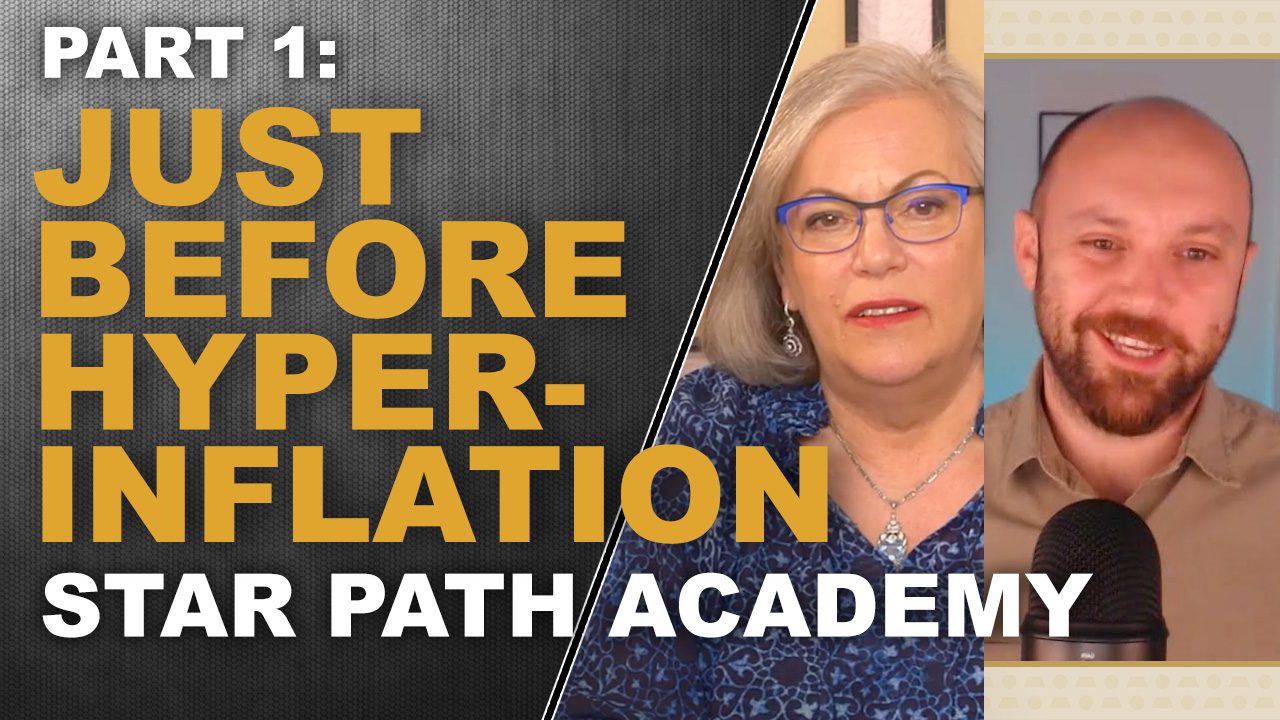
You know, we always talk about what’s happening with hyperinflation, etcetera. I have today a very special returning guest, Arpad from Star Path Academy. And he has a very interesting take on what is happening today and how that parallels. On his YouTube channel. He focuses on people that others that have also lived through hyperinflationary events. So I think that when he talks, I really like to listen.
TRANSCRIPT FROM VIDEO:
Lynette Zang (00:22):
I’m Lynette Zang, Chief Market Analyst here at ITM trading, a full service physical gold and silver dealer. And I’d like to welcome you to a very, very special edition of Coffee with Lynette. You know, we always talk about what’s happening with hyperinflation, etcetera. And I have today a very special returning guest Arpad from Star Path Academy. And he has a very interesting take on what is happening today and how that parallels. On his YouTube channel. He focuses on people that others that have also lived through hyperinflationary and events. So I think that when he talks, I really like to listen. And so well, when you were in Romania, what did you notice or what did your family notice? I mean, how, what were the signs that were glaring now, knowing what you know now, right? What are the, that you’re seeing that are glaring that were actually happening then, but you were missing?
Arpad (01:36):
Right? Well, our situation was a bit different because we were under communism and we were actually inflation was toward higher towards the end of that period of the end of the eighties before the major event happened. And the data was shot and this whole system changed and communism fell. However, just the feeling of the average person’s life getting harder and harder was kind of a tell that something will change. Now. We didn’t know that a communism will end that suddenly, right from what at least my parents told me they didn’t knew, but they knew that times were more turbulent and turbulent. And the life of the average person was getting harder and harder. Actually the dictators last speech was giving out free money, basically giving minimum wage increase of 10%, increasing this by so many percentage and the, the miners get this and that they were trying to kind of quail the situation or quiet now the situation, but that was also a show of desperation that this is happening. And soon after everything changed. So our, so of course I’m saying this because there are differences. And now of course we’re in capitalist societies and the free economy. So the signs may not be similar. However, if you take a look at the situation in North Africa about the Arab spring, usually the biggest sign or one of the last signs that is almost the sure sign is energy prices and food prices reaching sort of half of the average person’s salary and above. And there are indicators that kind of tell you where we are in certain countries based on energy price and food price and shelter price, of course, as well. So one, once that reaches a critical level it’s even if they print more money, it won’t help because, once the average citizen is aware that inflation is high, even they are trying to get rid of the money as soon as possible. And just talking with farmers here and even real estate investors here, they are talking just now today I talked with them and they are all saying, I shouldn’t have sold. I shouldn’t have sold. Now. They are not necessarily, you know, interested in what I have to say about gold, but they are looking at the market and they are realizing that it’s much easier to hold onto something and not sell it than sell it and not being able to repurchase that same asset last a month later, two months later, that means to me that the average person is now waking up. That means eventually the whole tide guys will change where they will know that things are falling apart, but by that time it’s already too late because you need to preposition yourself where you know, but at least be ahead ahead of the queue, if not, you’re too late, by the time you’re getting there. Well, so back to signs is the last sign is when the average person is waking up. That inflation makes it better for people to hold on to stuff, anything hold onto it, instead of selling it. That means that there’s the credibility that is fading in the currency. After that, it’s not much longer to be honest, that was the case in Romania.
Lynette Zang (05:12):
Well, you know, it is kind of interesting because, you know, you were talking about the eighties and said that, well, we didn’t know that it was gonna change that rapidly.
Arpad (05:20):
Yes. Yeah.
Lynette Zang (05:21):
You know, so communism fell, however, you know, what are the signs that you might be seeing here? I mean, look at food prices. And even though the wages have gone up substantially, they’re not keeping pace with the level of inflation and the rents, the, you know, housing costs and rent costs are going up. I think here in Phoenix, it went up 19% last year. I mean, that’s not what housing prices usually do. They’re not like, but they have been turned into a product too by wall street. So it’s really about that money. But are you seeing those parallels?
Arpad (06:03):
Well, I am. And I’m definitely seeing it now again with rent. It was different because communism and we didn’t have a free market for mortgage. It was different because it was all stay controlled or your company was together with the bank and together with the state making different budgeting systems, even for families, everything was budgeted out for you by the state based on what type of job you had. So it was different. But even at that point, it was getting harder and harder to control because you cannot force someone to rent out the space if they don’t want to, right? So what, what happened? It was that things got basically it was less and less available. So thing people hold onto stuff, even if they cannot rent it because it’s worthwhile to just keep it and maybe not rent it. And that means that they are no longer want anything to do with their currency. They would rather have what they, what they have. And I mean, at some point in my family, we went into collecting aluminum. We didn’t have silver, we didn’t have gold in the country, but we figured out it’s better to have aluminum stored in a storage play place. After the factories were kind of the during communism, we just went in and bought up aluminum and my father stored it in the storage area. Right. And that was our holding, like our not checking savings account, basically that we, we held onto stuff. And I think more and more people are realizing that even here in the United States, but at that point, it’s already, I’m saying that it’s already too late because what, what’s the next step? The next step is people running with the currency and spending it on anything, which is the ponzi scheme breaking, right? So this was sort of the last step, but really the other step. Well, prior to this, the disconnect between media and the regular people was another big sign, but this is a long term sign. I mean, during communism, it was state controlled media, but it was also very clear to anyone that anything that goes on there that just the states view of reality. And everyone had the basic understanding that you should not believe that you should just take it as what they’re messaging you, but that’s not the reality that you should base your own steps on basically. And another thing would be the disconnect between prices that are publicized and prices that are actual in the real life. For instance, well, I don’t wanna say price of gold now, but something similar back then happened that you could have a newspaper price. You know, we had newspapers, this is the price of X, but if you actually go out in the real market and trying to purchase anything, it’s way above that, it could be called premium. It could be give it any label, but there’s a major disconnect between what is publicized, what is the published reality and the actual street reality. That became normalized very fast and everyone understood that this was propaganda. So that’s another big sign that we could have paid attention to, but we thought it will be just like this forever. You know? Well, my parents and because I was fairly young.
Lynette Zang (09:32):
That’s what people think.
Arpad (09:32):
Excuse me?
Lynette Zang (09:35):
Right. Well, that’s what people think they think, well, they can just keep doing this forever. Right. But they can only do it as long, but I wanna go back and talk about a little bit about what the media was telling you and how people didn’t believe it, because we’ve seen a lot of surveys. Most people do not believe the media cause it’s just to small group that owns all of the media. And there’s also a lot of self censorship that’s going on these days, all around the world, including, you know, me personally, which I hate because we’re supposed to be able to say what we think. And, but yet now it seems like nobody can really have an opinion that varies from the powers that be, what’s your feeling on that? And, and is that a parallel that you’re seeing?
Arpad (10:26):
Absolutely. So for instance so my wife’s grandfather until the last of his days, he would talk in a lowered voice in his own home because he knew that, he was an accountant at a big firm. He knew that the phone could be tapped for any reason. And just for personal matters, they might not like what he has to say. So even in his own house, in his own, in his own apartment to the very last of the days way later than communism fell, he was still talking at a lower voice that, and he was saying, well, yeah, I know, but it became so internalized, right? Yeah. That that the walls have ears that became a lifestyle. And when that starts to happen and people internally censors themselves and censor their thoughts, that means that there’s a pressure from government or major entities outside that need to be completely kept on the population. But that also tells you that the desperate, how desperate that measure is to be honest, right? That means that the control is already being lost because more and more forced or more of more and more overt control needs to be pressed on people. And that is sort of like pushing a ball, a beach ball down and down towards the bottom of the ocean. Eventually that pressure keeps on building that there’s no force on earth that could stop it. Right. And that is a sign that things are breaking down. Things are breaking down. I don’t know how many years it will take to completely break down. But that is, I think, a sign that it’s things gonna change. And when they change, just like how that beach ball is kept down there, it’s snaps back up. And it changes like that really fast. It took us two months or one month to get out of communism into a complete libertarian mini state for a while with complete chaos while communism lasted for 40 years. So when it changes, it changes immediately and you don’t know what’s coming, right. So you don’t necessarily know what’s coming. So you have to be prepared because when things are playing out, you’re already too late. There’s nothing you can do.
Lynette Zang (12:55):
Right? Yeah. That’s, that’s critical. Were there also like a lot of different things that were happening at one time that that was, you know, maybe a distraction, but you’re paying attention to this and you’re paying attention to that and you’re paying attention to the other thing. And all the while the biggest change is really happening, because I think we can all look right now and we’ve got Russian Ukraine and we’ve got what’s happening in Canada, and we’ve got what’s happening in Turkey and different parts of the world, India, etcetera. There’s so many things that are happening right now that it’s hard to focus for I think for a lot of people, it’s hard to focus on the fact that the Fiat currencies at the end, but were there a lot of different things that were happening around you as the system was breaking down?
Arpad (13:53):
So it’s really, it’s a bit different again, because we had the system control the control system prior to communism in which we had many distractions in the sense that it was almost mandated that you focus on these things and those things and these numbers, and everyone, if you look at old videos of Romanian communist, everybody was mandated to clap. And there was always a major distraction and excuses, which is again, probably a not good parallel that it’s because of the flood it’s because of this it’s because the Americans, or I still don’t know if some of these are true that like excuses were made of why we don’t have potatoes or why we have shortage of potatoes it’s because if the Americans are spraying X or dropping Colorado beetles or something like that, which we had plenty of Colorado beetles, I don’t know if you guys were dropping it or not still to this day. I dunno. However, I’m saying that there’s a lot of excuses that you need to focus on world events that you focus on instead of actually just focusing on your family and making sure that you are safe and you are you know, taking care of yourself because that is sort of taking power away from them, which they didn’t want you to do. Right? They want you right. Dependent on the system. So there was a lot of that now, once communism was, I should say exterminated from the Romanian country, then we had a period of free press, basically, which was, everyone was a press as a new, new press coming in, at which point there was, again, another chaos and hyperinflation, but it was a bit different than what we had prior. So afterwards we didn’t have distractions because it was already hitting our face at that point. It was too late. Right, right. At that point, you had to make sure that your family is fed. That is when my family moved to the homestead and we started gardening there and doing anything we can to survive. That was a bit different. That was too late. I don’t think we’re in that phase yet. However, that is when the hyperinflation were very high inflation kicked in Romania. At that point, as I mentioned, we, we just did whatever we could to survive.
Lynette Zang (16:15):
Right. You, you mentioned mandates and that’s a word, unfortunately, that we hear an awful lot of these days. Yes. what do you, what’s your feel having lived through a regime where everything was mandated and seeing all of these new mandates that are, that are coming out and, you know, watching countries that were free and I’m gonna put America in that too, because of the mandates, etcetera, watching that shift, what kind of sense does that give you? I mean, does, is it kind of like a dejavu or do you think?
Arpad (16:53):
It’s the, one of the worst feelings to be honest because I mean, it really makes me emotional I mean, sometimes I look at videos from other Romanians who live in Canada and they’re the most outspoken people about what’s happening. Without getting political, they understand why they are reliving their youth, what was happening Romania. And you can see them everywhere, Romanians with broken English or with an accent. And they are, they are trying to warn people. And there are some people who are listening, but it is one of the worst feelings in the world because it’s a train crash, slow motion, and you’re on the train and everybody’s just heading forward with stuff that you already lived through and there’s very little that you can do. So it’s a very bad feeling to be honest, to go that go back where many of these people who are talking about it actually came from communist Romania. They escaped communist Romanian, where they escaped communism, followed them basically, or at least not communism, but those government mandates or the top down control system that seems to be implemented now more, it’s just, it’s a horrible feeling because it feels like where do you go next? You should, what do you do next? I mean, if the beacon of the free hope you know, of the freedom of the west, if this is falling, then where do you go next Antarctica?
Lynette Zang (18:27):
Wow. And you, you gave me chills when you said that, because I think that those words are absolutely true. And, you know, the CIA or a faction in the CIA did a study and said that the us is no longer a democracy. It is an anocracy, which is loosely a democracy co-mingled with dictatorship. And I don’t think that really works to be honest with you.
Arpad (18:57):
Right.
Lynette Zang (18:59):
Would you…
Arpad (18:59):
It’s, it’s really crushing on the human spirit because I mean, what will eventually happen if this continues we’ll have another 30 or 40 years of a very bad situation because I, have my theories and because every 10th generation or so kind of forgets what real government or representative government looks like. And they, they go off in, in a tangent in a different reality and they want to be provided for and so on and so forth. And they have to learn their lessons and usually they learn their lessons. Right? And it takes, it’s a very hard lesson, but they have to learn it. So unfortunately we might be at the point where the Western countries that have enjoyed freedom for so long, they need to learn their lesson, which I really hope doesn’t happen because hopefully enough people who already learn their lesson can, can, you know, share our experiences. But it needs to find years.
Lynette Zang (20:06):
Yeah. I mean, that’s where your frustration is and the Romanians that are living in Canada, but, you know, I mean, we are definitely not immune to that. Having shifted to an anocracy here in the U.S. That scares the crap out of me, quite honestly, it really does. Do you think we’re actually gonna learn this lesson? Because I can’t really see this going on…You know, part, part of problem is where we are inside of the currency’s lifecycle. We’re at the end, there’s no purchasing power left. So it feels like this is a huge grab for control because the powers that be know that they’re losing control. Is that the way you see it as well?
Arpad (20:52):
Definitely. I do have a little bit of hope. I do have a little bit of hope. Actually more and more with these coming last few months. However, that is because, I mean, when the people talk about the American exceptionalism and so on they miss, from at least my perspective, they misunderstand it because I think America was/is exceptional. It’s very exceptional. I love this country because it was set up a totally different way. How many of the European countries have been set up from the get go. Because I mean, just from the constitution and the laws, and I mean, it is limiting government and letting people like it was totally different. How many European countries were set up and as long as people kind of still remember that and why it has been that, and the education would be there. I think it has a lesser chance of folding who dictatorship than the European countries had because it was set up differently. And I’m hoping that people would realize that and live up to their exceptional state and live up to the exceptional government that they had historically, which was the best government form of that we knew right? So I would hope we keep memory and hopefully some of us can help you keep that memory. So I do believe that it will be much worse. I mean, much harder to implement the bad government here because of these systems are still believed in and in place right now. However, I’m afraid that a major, a crisis that would happen that would change people’s mind about this, and they would throw their history away. They would throw everything away to to reach out and demand a bigger government demand, a a different type of government. So they are taken care of because this, this system would be that much broken down. And the antidote for that in my perspective would be right now, we should deleverage and kind of work on our dependency on the system, because if we are very dependent on a broken system or a system that is breaking down, then many of us in the United States or the people of the United States, you will demand a different type of government because you’re doing so bad. Right, right. Because, your system is breaking down. But if you at least have some autonomy that you can grow your own food, then whatever happens, you may have a bargaining chip when eventually the system changes. No, I don’t like what you’re proposing. And I don’t have to agree to that because I have a way how I can take care of myself, my family, my community. So if we work on those in time and there’s not much time, but if there’s still time, if we work on those, whatever changes, we can demand that no, we’re not going to play along. We like what we have now. We like the current form of government. We like the current form of America with liberties and freedom at the center.
Lynette Zang (24:04):
Well, I would agree with that, but I’m also, you know, and it’s, it’s interesting to listen to your point of view, because this is why you came here, was for the freedom. And over the course of my lifetime, I’ve watched that erode more and more and more, and I love the constitution. But I’m unfortunately seeing the federal government. I mean, it used to be the individual. And then the states, the state governments were supposed to support the rights of the individual. And then the federal government was supposed to support the state governments in supporting the rights of the individual. But over time it has completely flip flopped. And I think our founders, our founding fathers are rolling over in their graves with what they’ve been watching happen, which every crisis has been used to erode the freedoms more and more. And the other thing that I’m seeing and you kind kind of alluded to it with your grandfather who was an accountant?
Arpad (25:12):
My my wife’s grandfather. Yes.
Lynette Zang (25:14):
Oh, your wife’s grandfather and the walls have ears. And what I’ve been watching in Canada and in the U.S. And other places are governments getting neighbor to spy upon neighbor, family member, to spy upon family member. So that even in your own home, if you’re having and Hey, let’s, let’s face it. We’ve got cell phones, we’ve got computers, we’ve got all this smart crap in here. And I don’t think that most people, I know, I wouldn’t necessarily know how to dismantle it so they can hear everything if they want to. And they could probably see everything if they want to. But if we go back to before we even had those, were there issues like that in Romania? Where, where neighbors spied on neighbors? Because that is what happened during the Nazi rule. That was definitely a big part of it. So are you seeing that as well?
Arpad (26:17):
Well, of course there was things like that in Romania, the secret police and so on, but always remember they they’re dependent on your cooperation or at least your neighbor’s cooperation in order to implement this panopticon which is everybody is being watched, but nobody knows if you/they are being watched specifically. You just know that you’re being watched. And that way, what the purpose of this was actually to internalize your submission. It’s not just, you don’t talk about things, but you start, stop even thinking about things. So it is sort of a mass hypnosis that’s going on. That’s the effect. Oh, wow. The effect is psychological that you are in the prison of yourself of fear that your neighbor or will report you. Whether the neighbor or the phone will report you or not, technically the only way to get out of the prison that you don’t care. You don’t care if you’re being reported or not. Right. Because you, you know, that enough of you don’t care that the system cannot be implemented without your consent, because for instance, in Romania, even preachers, right? Once they, the secret police took you in the middle of the night and if you’re, if you’re head of a congregation, they did stuff to you or they took you know, your family away. And then they send you back to listen on your own church. Right? And actually many, many preachers were secret informers of the government because they had to. And they, I mean, now they have books that what they had to do and how bad they felt and, you know, it was horrible for them. And some got executed under communism. So it was horrible. But technically way of fighting back is that you don’t care. I mean once, once you start caring about these things, you are already in the trap, right? You should, you should just speak your mind and whatever happens happens, because I mean, there are things worse than death in life, you know? So you just have to be you just have to live free and inspire other people to live free. And I think that’s possible. So the system is psychological. The trap is psychological, that you are afraid of your own phone. Maybe they’re less, maybe not, but if you’re afraid of your own phone, then you will stop having dissident thoughts. So say, or unwanted thoughts at that point. It’s too late because I mean, they won.
Lynette Zang (29:00):
Whoa, whoa, whoa. So are you, and so you are saying that you do see the parallels here?
Arpad (29:10):
Well, absolutely because…
Lynette Zang (29:13):
I mean, I wanna talk about, you know, really the whole point is that we need to have people see what’s really happening. Then we need to talk about the solutions which we’re gonna do in just to minute, but with everything that’s going on, what other parallels do you see? How close do you think we really are? I mean, do you think…I mean, I already know, I don’t think this can possibly even begin to continue for the next 40 years because there’s no value left in the currency. We’re already, you know, even though it’s not official yet, I do think that we have begun we’re in the early stages of hyperinflation. Do you? I should ask you that. What do you think?
Arpad (29:59):
Well, when I said the four years, I mean, after sudden change, there might be a 30-40 years of a very different form of life.
Lynette Zang (30:09):
Okay. That would make sense
Arpad (30:10):
Relationship between government and people that might follow after a big crash. That, so I’m not saying we have 40 years, but I’m saying
Lynette Zang (30:19):
To continue on. Cause it’s been about 40 years.
Arpad (30:22):
If something happens, it will take 40 years plus to get back to a state of Liberty that we enjoy now, or we have enjoyed 10 years ago because it will, at that point it will keep on getting worse and worse until it breaks the breaks the cycle back basically. So how long we have, I don’t know, because I don’t necessarily know the plans, but you can speculate based on what, you know, the powers that be want to achieve. If they just want to continue this slow state of erosion, then we might have more time. However, if that doesn’t work, they might crash the car into the wall directly because one thing people forget is that the the shortages and the poverty is actually a tool of tyrants. It is not bad for tyrants, because of shortages. And because of poverty, you can get the neighbor to spy on you. You cannot get the neighbor to spy on you, if everything’s going good, right. Because they have morals, right. They don’t wanna do that. Nobody wants to do that. Right? Yeah. however, when there are shortages and when there is food scarcity, people do what have to do to survive just how these priests had to do what they had to do to survive. And now they’re writing memoirs and committing suicide and so on, you know, God forbid what happens. So they were forced to that. So people forget that shortages and the bad living situation, is a specific tool of tyrants, right? So if things get worse because things cannot continue, then life might change really fast. So it depends on what, if they can continue with this slow pace. Then we might have seven years in my opinion, three years, whatever happens. I’m not saying we have that much time until you can act, you should act now, right? You act today or tomorrow, and then wait out the seven years, but don’t get frustrated if it continues to break down yet, still not completely broken down in seven years. That’s what I’m saying. But if they are losing control, then they could crash the car or the bus intentionally and use that trap to gain immediate control. And at which point, I don’t even know how much time we could have, right. It depends on if we reach a critical mass of awakening in time or not. If we don’t reach a critical mass of awakening of people, then there’s really few little chances of stopping this. If we do, then we immediately need to work on being self-reliant because at that point we can tend to each other and tend to our family without the system intact. And even if it crashes well, good, then we’ll form our system. We don’t need to take yours.
Lynette Zang (33:30):
Right. Well, you mentioned shortages and isn’t that what we’ve been experiencing for the last couple of years and those shortages haven’t gone away. It seems like they’re getting worse.
Arpad (33:43):
Yes. It does feel like you don’t need to do much to solve shortages in the free economy because people want to are entrepreneurial. If you see shortages, you can just move the goods from here today, yourself and use the price arbitrage to pay for it. And then more and more people do that and the prices go down, right? So in free markets, I mean, it has major problems sometimes, especially with big actors and governments being involved and things can get worse, but normally people want to solve things, right? You wanna solve things. Your neighbor wants to solve things, and you both believe in each other. And you know, everyone that you meet is sort of a nice person in their own way, and you don’t wanna solve problems and people see opportunities. However, if they are specifically forbidden to solve these issues, then that means that something fishy is going on somewhere. So I don’t know why the shortages are not being, not being solved. But it should not be that hard to solve it. Now again, if there are goods that need to be imported, it might be much difficult. I’m not saying, but then again, I mean, there are government actions that we specifically took to make goods that are outside of the state expensive, right? …usually a law for it, or a green something or a piece of paper somewhere that forbids it.
Lynette Zang (35:21):
I was, I was just reading a financial times article this morning on what’s happening over in the UK with the farmer’s association. And basically the statement was that the government was making it almost impossible for the farmers in England to produce food for England. Right. And we have shortages on the shelves. Right?
Arpad (35:48):
Right. Well, I mean, unfortunately, nobody wants a black market. Nobody really wants a black market. The black market is a necessity of people needing to solve their issues like shortages and so on under the table, because there’s no legal way of doing it. So when we had huge black markets in Romania, it wasn’t because people enjoyed having it. And it’s really, it’s a bad price discovery mechanism. It’s not good for anyone, including the government. Right. It’s not good for everyone, anyone, anyone involved, however, it’s, it’s filling a necessity, right? If, if there are shortages, people will try to solve that with the black market. So once the black market kind of picks up at that point, we’re in the end game, because at that point something major will happen within months. Right?
Lynette Zang (36:47):
Wow.
Arpad (36:48):
I can, I can see like a black market developing because I think I, I don’t think the shortages are caused, like they are being kind of overblown that people are holding back goods back goods. There are like a glut is happening. There is something like that, but that is because it’s financially incentivized. It’s incentivized for you to hold onto your goods because the inflation is just too high. It’s better for you to sell your goods a year from now than to sell it today. If that is an environment, that has been created by the federal reserve, then there are no good solutions for it. Once all of these products or services or anything else has been piled up, where will it leave? It will leave to the black market through its actual price on the black market price discovery, how it was in Romania, right? Eventually people who work like for instance, in Romania, we had right. Gas shortages. So what happened, people who worked on government bases, army bases they worked together with outside entities, so they could steal the gasoline from the base. Right. And that way, I mean, when, when there are desperate times, people do desperate things and we have horrible stories and nobody wants that. It wasn’t good for the one who purchased it. It wasn’t good for the one who sold it. It wasn’t good for the people who guarded the base. Right. But when there are desperate things like that start to happening at that point, you know, something’s something needs to happen.
Lynette Zang (38:33):
Well, Arpad, you know, we’re, we’re running outta time on the problems. And then we wanna get to the solutions because I mean, we hear about the problems constantly, but is there anything else that you want to, as far as the problems are concerned that you’re seeing the parallels that make you believe that in the direction that we’re headed into, you know, really hyperinflationary reset something you’ve already experienced?
Arpad (39:03):
Well, there are many things. I mean, I would have to make a list and come back for another interview however.
Lynette Zang (39:09):
We can arrange that!
Arpad (39:11):
Government handouts was another. So when even, I mean, you can take a look at the videos of the last speech of the dictator, as I said, how surprised he was that nothing is under control anymore. And even then he tried to increase the government handouts. At some point it won’t work. And I can tell you why, however, increasing those and for specific groups of people or industries, you get this much handout, that much handout that is to kind of make people envy each other and work against each other, instead of realizing the real problem upstairs, right. For instance, for whatever reason Ceausescu chose the minors, right. And Romanian minors, he made sure that those were the people that were somewhat well fed because he could use that as a leverage against to quail to be down basically protest in big cities, which has happened in TimiÈ™oara. So major problems start arriving when we get to that, hopefully we can work together and understand each other each other’s problems. So it doesn’t get to that. However, when government handouts start targeting different groups of people or different industries that is actually, know that that is control mechanism, that is a control mechanism that they can use right? Another and another thing that was like child care free child care from the government basically issued checks based on how many children you have here you go a lot of money because then I mean, I don’t wanna say this, but wars are controlled by the mothers. So a father goes to war if he has to, but you know, if the mother doesn’t want the father to go to war, then the father won’t. So as long as the children are somewhat kept safe, then people will not go do horrible things because they don’t have to. So of course it doesn’t work for the long term, but they can use this as a mechanism to kind of quiet down a populous, right. So that has happened. And we’ve had checks issued per kids per for moms. And that would buy you a check would buy just for food. So they could not control the price of food anymore, however they could issue checks right? Well, interestingly, in, in these checks some inflation was already calculated in where the first check was for 30,000 Romanian leu, which was probably good for food for a month for a family of four family of five, maybe actually for the 12 months, because it was a checkbook that was issued and you had to go to the government and had a, it stamped and go to the post office to get cash for it. And then you could purchase with the cash, newly printed cash you could purchase groceries. The last check, the first check was 30,000. The last check was 90,000. So they already knew that it will triple minimum. Well, it turned out $90,000, I think by the second year check or whatever, I don’t quite remember. At some point I remember kids going and running with the checkbooks because that amount of money was barely enough for candy. So it can get weird really fast and you have no idea how fast it can get, right? So the, so the mom would hold the check and just give it to the kids and they would play with it and go buy some candy because people would trade the checks and, and things like that. So government handouts is one thing that you can expect then a government forgiveness of debt. That is another thing that I can for sure will happen if things go south, because for instance, I don’t, we didn’t have that again. It was, communism was horrible in different ways. What is happening here could be horrible in different ways, but I would assume at some point the student loan debt will be forgiven, but that point will be, I would agree right before that debt would be only worth a couple of loafs of bread. Anyway. So I’m saying if you have $30,000, or let’s say $60,000 worth of debt, they will forgive it to you. So you are happy so they can buy a little time for themselves. But by that time, actually $60,000 won’t buy, I don’t know, a worst month of food. So technically your debt, your students loan debt, would’ve deteriorated with inflation anyway, but they want to have that kind of boost in morale, right. That you are now subservient to them because they forgave your loan. So things like that is expected again, minimum wage. Well, they couldn’t raise the minimum wage for years right now. Okay. Everyone, how almost sudden. Okay. So they raise it for $15 and $15 won’t value a can. Right? So that’s what I’m saying. They will use these cheap tricks to still kind of slowly buy time for themselves. So once that happens, I don’t know. I mean, I can tell you what to do, but that’s another segment, buy stuff fast. That’s the main, that is the main thing.
Lynette Zang (44:52):
Exactly. And you know, if you wanna hold onto your purchasing power, you wanna hold gold and silver because that’s real money and it has the broadest base of utility. And this has been great. This is part one. Now we’re gonna go on to part two, just watch part two on the solutions to these problems. And I’m very excited to say on our new YouTube channel called Beyond Gold and Silver, we’ve been waiting for this forever, working on it forever, I should say, but it also feels like we’ve been waiting for it forever. And now it’s finally here and I’m so glad that Arpad, you are the one to help us kick this off and bring value to everybody. So until next time until you see part two anyway, be safe out there. Bye bye.

